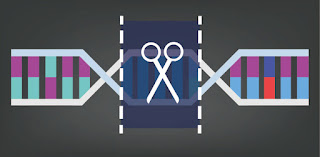What are genome altering and CRISPR-Cas9?
Genome altering (additionally called quality altering) is a gathering of innovations that enable researchers to change a living being’s DNA. These advancements enable hereditary material to be included, expelled, or changed at specific areas in the genome. A few ways to deal with genome altering have been created. An ongoing one is known as CRISPR-Cas9, which is short for grouped routinely interspaced short palindromic rehashes and CRISPR-related protein 9. The CRISPR-Cas9 framework has created a ton of fervor in established researchers since it is quicker, less expensive, progressively precise, and more proficient than other existing genome altering strategies.
CRISPR-Cas9 was adjusted from a normally happening genome altering framework in microscopic organisms. The microscopic organisms catch pieces of DNA from attacking infections and use them to make DNA portions known as CRISPR exhibits. The CRISPR clusters enable the microorganisms to “recollect” the infections (or firmly related ones). On the off chance that the infections assault once more, the microbes deliver RNA fragments from the CRISPR clusters to focus on the infections’ DNA. The microorganisms at that point use Cas9 or a comparative catalyst to cut the DNA separated, which handicaps the infection.
The CRISPR-Cas9 framework works likewise in the lab. Specialists make a little bit of RNA with a short”guide” arrangement that connects (ties) to an explicit target grouping of DNA in a genome. The RNA likewise ties to the Cas9 chemical. As in microbes, the changed RNA is utilized to perceive the DNA succession, and the Cas9 catalyst cuts the DNA at the focused on area. In spite of the fact that Cas9 is the protein that is utilized frequently, different catalysts (for instance Cpf1) can likewise be utilized. When the DNA is cut, analysts utilize the cell’s very own DNA fix hardware to include or erase bits of hereditary material, or to make changes to the DNA by supplanting a current portion with a tweaked DNA succession.
Genome altering is of incredible enthusiasm for the anticipation and treatment of human ailments. At present, most research on genome altering is done to comprehend ailments utilizing cells and creature models. Researchers are as yet attempting to decide if this methodology is sheltered and viable for use in individuals. It is being investigated in research on a wide assortment of sicknesses, including single-quality issue, for example, cystic fibrosis, hemophilia, and sickle cell illness. It likewise holds guarantee for the treatment and counteractive action of progressively complex sicknesses, for example, malignant growth, coronary illness, psychological sickness, and human immunodeficiency infection (HIV) disease.
Moral concerns emerge when genome altering, utilizing advances, for example, CRISPR-Cas9, is utilized to modify human genomes. The greater part of the progressions presented with genome altering are restricted to substantial cells, which are cells other than egg and sperm cells. These progressions influence just certain tissues and are not passed starting with one age then onto the next. In any case, changes made to qualities in egg or sperm cells (germline cells) or in the qualities of an incipient organism could be passed to who and what is to come. Germline cell and developing life genome altering raise various moral difficulties, including whether it is allowable to utilize this innovation to improve typical human qualities, (for example, stature or knowledge). In view of worries about morals and security, germline cell and fetus genome altering are right now illicit in numerous nations.
Check out our links below:
Official website: https://joygag.com/
Twitter: https://twitter.com/JoygagO
Instagram: https://www.instagram.com/joygagofficial/
Facebook: https://www.facebook.com/joygagofficial/
Telegram: https://t.me/joygagofficial



Комментарии
Отправить комментарий